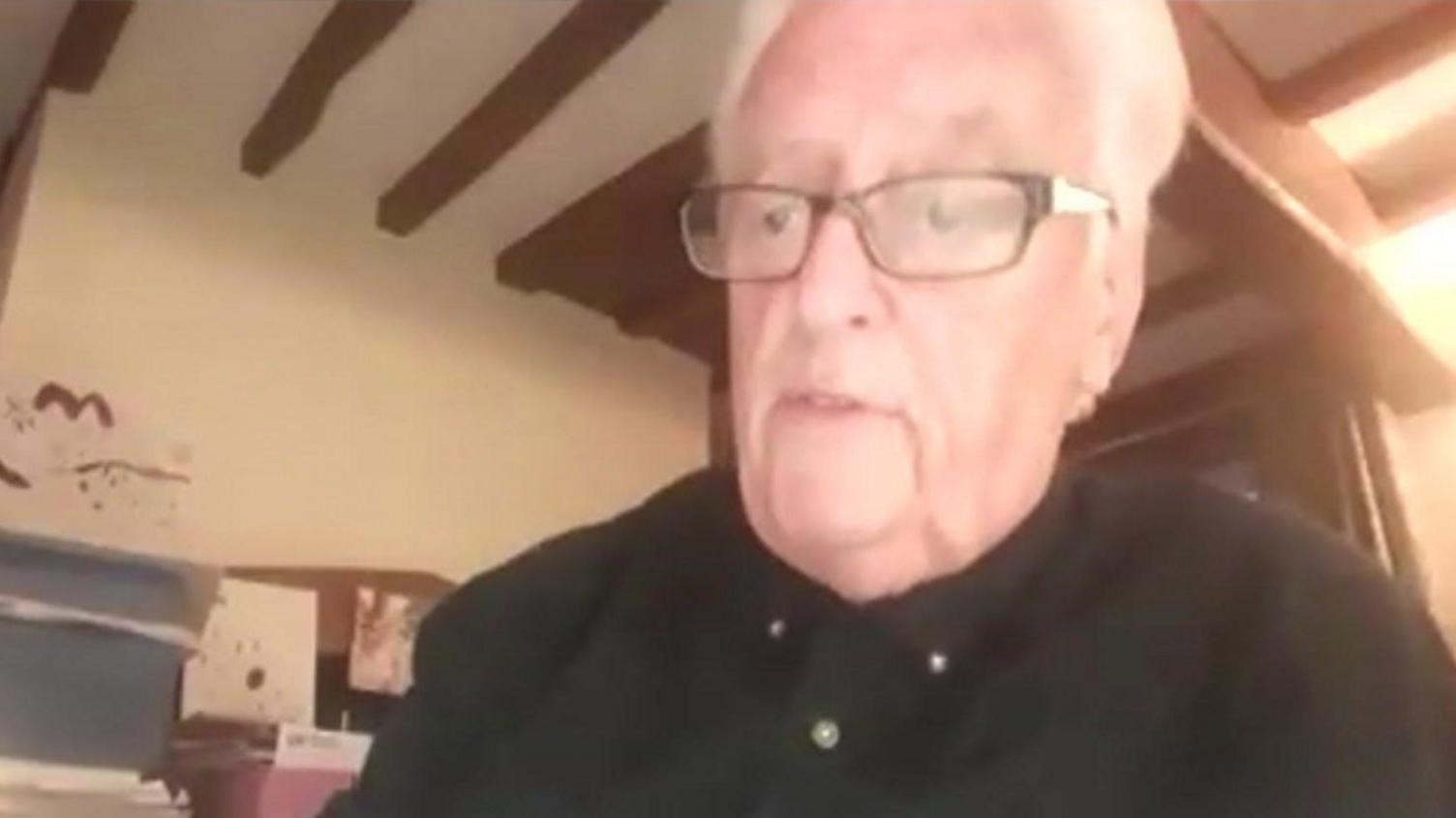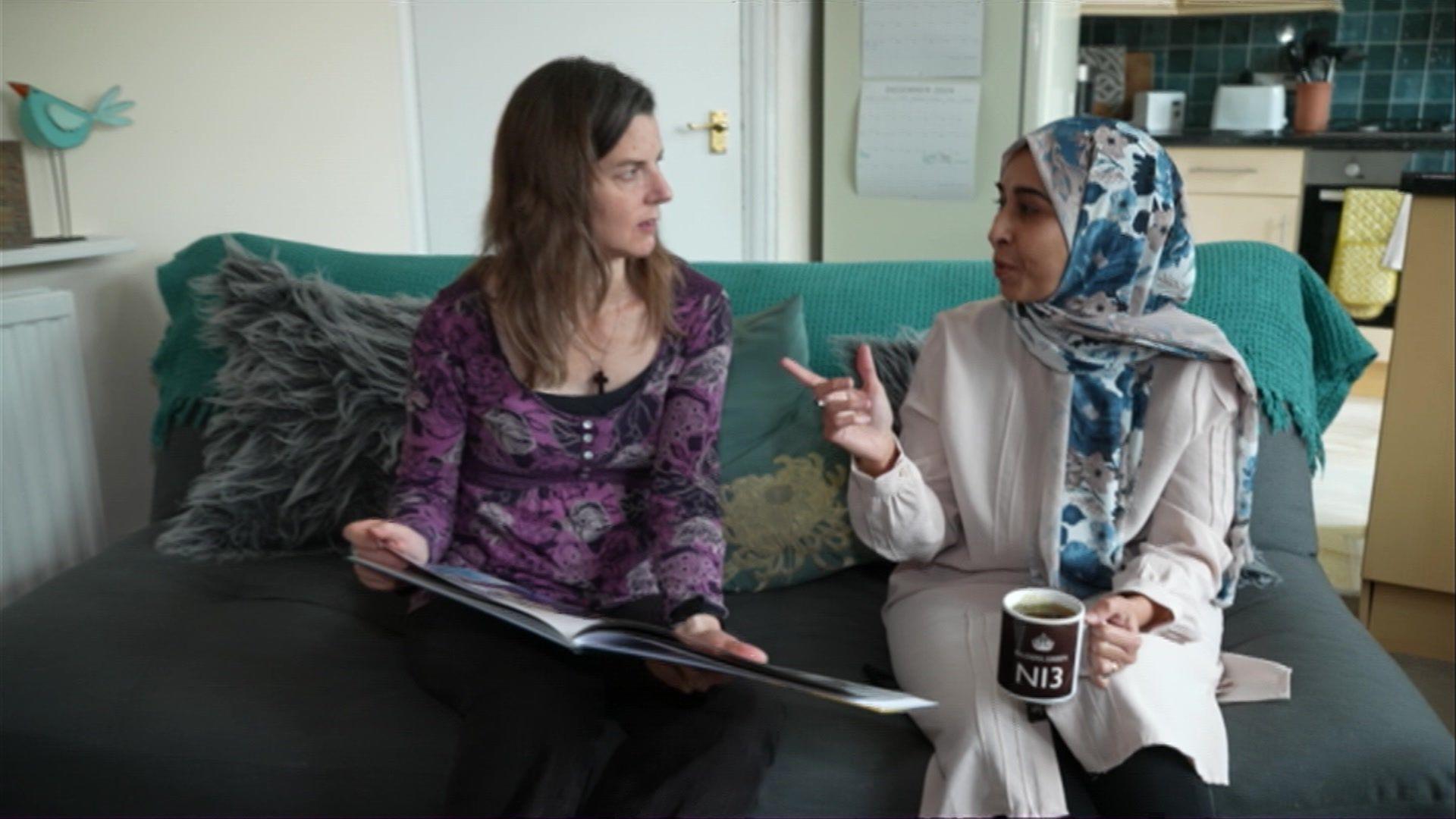Clare Rogers says her daughter Zoe has been branded a terrorist
In August, Clare Rogers' daughter was arrested after allegedly taking part in direct action at an Israeli defence firm near Bristol.
"I discovered, three days in, still no phone call, that she was held under the Terrorist Act. And that meant seven days in solitary, and no right to a phone call... It was shocking," she said.
Zoe Rogers, 21, is one of a group of pro-Palestinian protesters charged in relation to an incident at the Elbit UK, part of Elbit Systems, a global Israeli defence firm.
Zoe was eventually charged with criminal damage, violent disorder and aggravated burglary and denied bail. Her trial is not set to take place until November 2025.

Zoe Rogers is one of 10 activists who was arrested by counter terror police
"The idea of my daughter being branded a terrorist just fills me with horror," Clare said.
She added: "Someone who believes so passionately in justice, is lamenting the deaths of innocent civilians and children. To be called a terrorist?
"That really disgusts me.
"It makes me very angry and it worries me about the future of activists in this country, and the expression of free speech."

Zoe Rogers is being held without bail
Although Zoe was not charged with a terror offence, she and the other activists arrested at the same time were denied bail because the Crown Prosecution Service claimed there might still be a terror link. It was Zoe's first alleged offence.
"The day she appeared in court I will remember for the rest of my life. I hadn't seen her for seven days. I hadn't been able to speak to her," recalled Clare tearfully.
"The judge said 'no bail', and the next few seconds she was led out of the courtroom.
"That memory, it will stay with me forever. It was literally my child being taken away from me. I will never rid myself of that memory and the trauma that went with it."
'Mum, the marches aren't working'

Clare believes Zoe should have got bail
"She is someone who is very loving and very shy," Clare says of her daughter.
"She thinks very deeply and cares very deeply about social justice. She started to see what was unfolding in Gaza and that became a huge part of her life."
Zoe went on most of the pro-Gaza marches calling for an immediate ceasefire, but started to feel disheartened.
"She said to me: 'Mum the marches aren't working, the government's not listening.'"
Counter-terror laws 'used to intimidate'

Sukaina Rajwani's daughter is also being held without bail
Sukaina Rajwani is from Merton in south London. Her daughter Fatema Zainab was also arrested and charged as part of the same operation, and is also being held without bail.
"I believe the counter-terrorism legislation was used to intimidate and scare them and used as an excuse to keep them for longer," she told BBC London.
"I honestly thought she would get bail because she doesn't have a criminal record or convictions. She met all the bail conditions.
"She is literally a baby for me. She had only just turned 20 a week before."
Neither Clare nor Sukaina say they had any idea that their daughters might have been planning direct action with the group Palestine Action.
In a statement to the BBC, Palestine Action defended direct action and condemned the use of anti-terror laws.
"Elbit Systems, Israel's largest weapons producer, market their arms as "battle-tested" on the Palestinian people," it said.
"By misusing counter-terrorism powers against those who take direct action to shut Elbit down, the state is prioritising the interests of a foreign weapons manufacturer over the rights and freedoms of its own citizens."
Elbit Systems UK told the BBC: "We are proud to provide critical support and advanced technology to the British armed forces from our sites in Bristol, and this work has continued uninterrupted today.
"Any claims that these facilities supply the Israeli military or Israeli Ministry of Defence are completely false.”
'Law being correctly used'

Jonathan Hall KC is the independent reviewer of terrorism legislation
Some UK human rights organisations are concerned the legal definition of terrorism is too wide and is increasingly being used to crack down on legitimate protest and free speech.
And organisations such as the National Union of Journalists (NUJ) are also worried about the use of counter-terror legislation by police.
Michelle Stanistreet, NUJ general secretary, said: “The rise in the use of counter-terror legislation by British police against journalists is alarming and we are concerned recent cases are without clear or sufficient explanation to those under investigation.
"Being able to report freely on issues in the public interest without fear of arrest is a fair expectation for every journalist abiding by the union’s code of conduct. We have urged an end to the apparent targeting for its harm on a free press and the risks posed to both journalists and their sources.”
However, the independent reviewer of terrorism legislation, external, Jonathan Hall KC, believes the law is being correctly used on the whole.
"Just gluing yourself to the road is never going to be terrorism. Holding a placard is never going to be terrorism unless it's for a proscribed organisation. It's got to be serious violence against people or serious damage to property.
"It's got to hit that seriousness threshold before that could even apply."
But he says it is a fair criticism that the authorities hold a huge amount of power in the context of terrorism arrests. These situations, he says, are an operational decision for the police.

Human rights lawyer Michael Mansfield says the definition of terrorism is "in the eye of the beholder"
Michael Mansfield KC is a leading barrister in human rights and civil liberties. Without commenting on this specific case, he told the BBC that he believed protest was a right, not a crime.
"Genocide is occurring in many areas of the world. Genocide is an international crime. You've had a court recently indicating that the occupation of the Palestinian territories has also been unlawful for the past 75 years.
"People are saying, 'What is happening about this? Where is the accountability?'"
He admits that direct action can sometimes be a crime.
"Whether the crime you've committed is terrorism, that is the question," Mr Mansfield added. "Some of these issues are in the eye of the beholder."
'She should be at university now'
The probability of being held without bail until November 2025 has had a dramatic effect on the lives of both Zoe and Fatema, whose university places are at stake.
"She should be at university now. She'd got a place to start this autumn, her first year at university," said Clare of her daughter, who has been diagnosed as autistic.
"She worked so hard for that place. She had to do an extra year of sixth form because of Covid; she didn't get the A-levels she needed for her chosen university.
"She did another year of study, got the place, and now she can't start. She can't even start next year, because she will be standing trial. That has been devastating for her."
Fatema Zainab would be doing her final year in media studies at Goldsmith University were she not behind bars.
"God forbid if they do not get bail on their next appeal, then she will try to defer for another year, " said Sukaina. "It's all unchartered waters. Every day brings a new challenge."

Clare and Sukaina have been supporting each other while their daughters are in jail
I asked Clare whether there is a difference between the right to free speech and direct action.
"Someone taking direct action to disrupt the Israeli arms industry, there is a law that oversees that and it is called criminal damage," she maintains. "It's not terrorism."
"If you look at what the suffragettes did, they were quite violent, they destroyed property, they put bricks through windows. We look on them as heroes.
"I think people will look back at people who took direct action in this context as heroes in the future."






